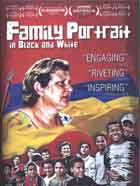
Family Portrait in Black and White 2011
Distributed by Interfilm Productions Inc.,, 304-1515 West Hastings St., Vancouver, BC V6G 3G6, Canada; 604-638-8920
Produced by Boris Ivanov
Directed by Julia Ivanova
DVD, color, 85 min. and 52 min. versions
Sr. High-General Adult
Adoption, Adolescence, Children, Child Development, Parenting, Area Studies, European Studies, Ethnic Studies, Social Work, African Studies
Date Entered: 09/24/2012
Reviewed by Gisele Tanasse, University of California BerkeleyFamily Portrait in Black and White presents an intimate look into the daily challenges facing Ukranian Olga Nenya, half Stalanist dictator, half motherly saint. Olga cares for her brood of 16 foster children, mostly children of mixed-race abandoned by their white mothers, with an iron hand in a very modest home without a toilet or running water. Ever the task master, the children's free time is filled with various domestic and agricultural chores, tending the vegetable garden, feeding goats, cleaning house, cooking and doing schoolwork. We are also privy, though, to very tender moments, including Olga comforting and caressing her children, a sister happily sharing her modest bowl of berries with 11 of her siblings and Olga's anger and fear of losing her children when a herd of government inspectors come, giving her a truly bizarre verbal lashing over the use of plastic plates. This home-life stands in stark contrast with the racist, xenophobic remarks we hear from locals and neighbors, who at best, feel a superior pity towards the children, but more typically would seem driven to intimidate and possibly cause them physical harm. Even Olga's adopted children look down on African students they pass in the street, using racial epithets and making horrific comments that the students merely wish to seduce white Ukrainian women. It seems, however, that any pride or air of superiority that Olga instills in the children is less a commentary on the shortcomings of the fathers, and more of a reflection of the value that Olga places on her children as assets to their country—the Ukraine—cannot afford, according to Olga, to lose such jewels as her children. Rather, she fights to keep them in the Ukraine from undoubtedly better lives with summer host families who would like to permanently adopt several of them in Italy. Ultimately, the older children cannot get away fast enough: one immediately moves to be with her host family in Italy upon turning 18, the other distances himself once at college, equating Olga to a totalitarian dictator, the children to the exploited masses and anyone who questions her authority to a political dissident. In this way, Olga's patchwork family is identical to many others in poor rural settings, where the young rebel against tradition and fate. And while Americans have become accustomed to seeing super-sized families in reality television, between 19 Kids and Counting, Kate Plus Eight and Nadya Suleman (aka "Octomom"), Family Portrait in Black and White not only stands out as a fascinating glimpse into the post-Soviet Ukraine, it highlights many of the universal struggles that come not only with adoption but with being a child of mixed-race. It is therefore recommended for courses relating to international studies, ethnic studies, children, and human rights. It should be noted that the educational DVD with PPR is packaged with both a full-length 85 minute version and a 52 minute version, perfect for the classroom.